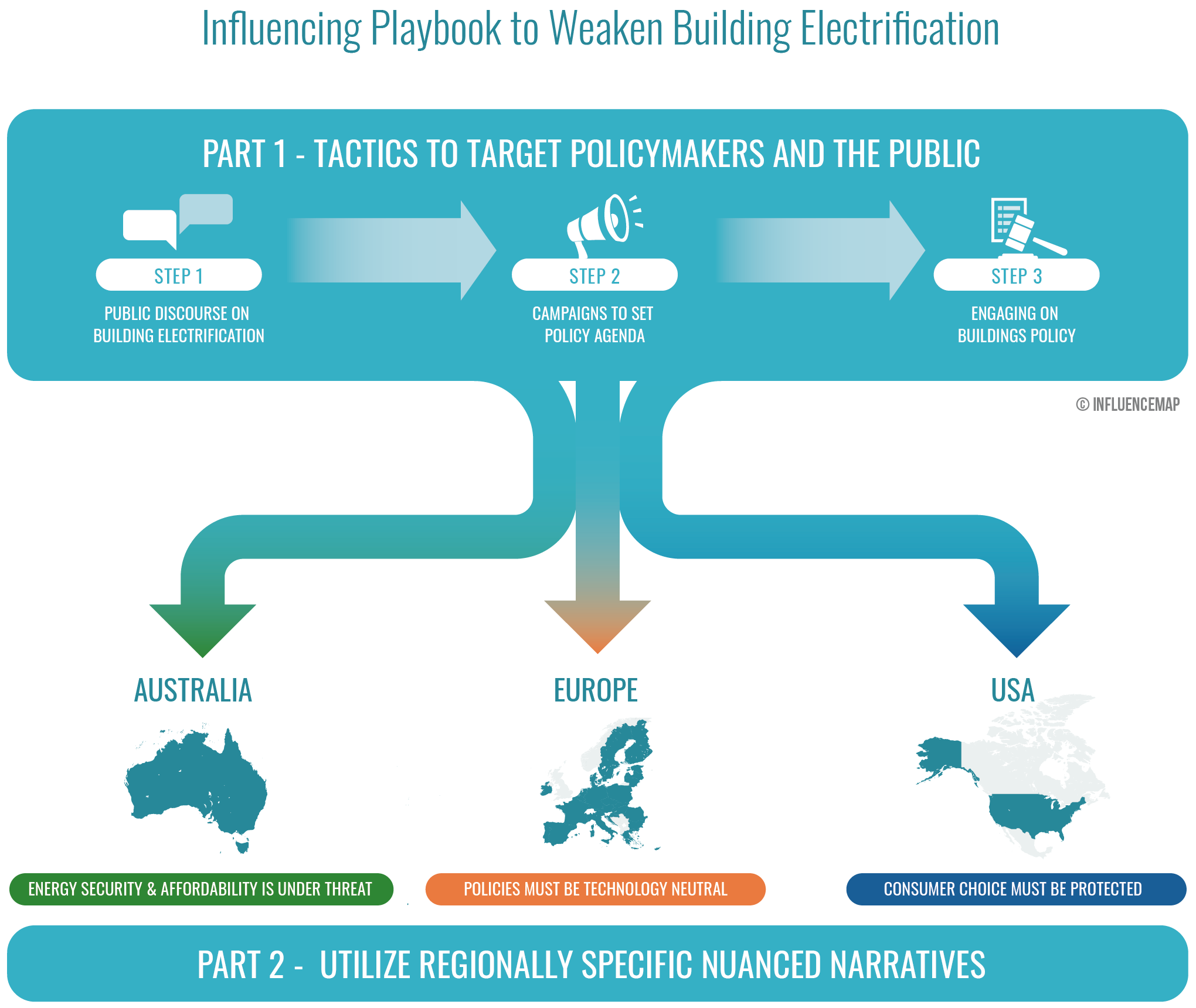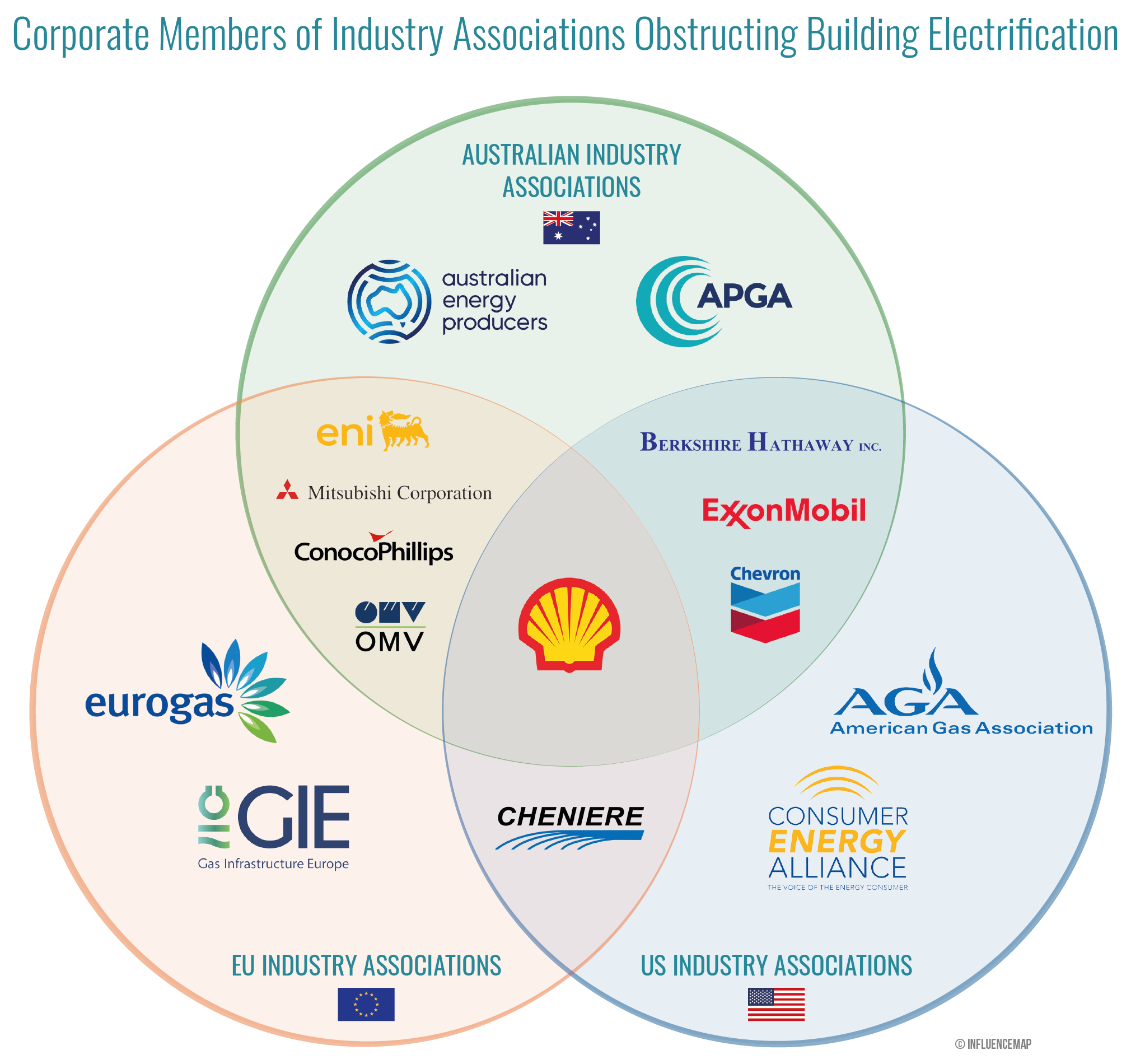A new report from InfluenceMap details a strategic, coordinated campaign—spearheaded by the American Gas Association (AGA) and the National Propane Gas Association (NPGA), among others—to weaken US building electrification efforts and generate stakeholder opposition to transitioning away from fossil gas appliances (particularly gas stoves). It finds that the oil and gas, and utilities industries are employing a toolbox of tactics toward this end, including direct lobbying of policymakers and engagement with policy, the coordination of local coalitions and front groups, legal action, social media advertising, and public statements.
Industry advocates in the US have developed bespoke messaging around the idea of “consumer choice” aimed at shifting public opinion away from favoring gas bans. This argument was used in over 50% of tracked engagements, with at least 23 different companies and industry associations using identical or very similar language.
Significant advocacy was found in the US from AGA, CenterPoint Energy, Consumer Energy Alliance, CMS Energy, Dominion Energy, DTE Energy, Eversource, Duke Energy subsidiary Piedmont Natural Gas, Berkshire Hathaway subsidiary MidAmerican Energy Company, Exelon subsidiaries BGE and Pepco, National Association of Manufacturers (NAM), National Federation of Independent Business (NFIB), NPGA, Sempra subsidiary SoCalGas, Southern Company, AltaGas subsidiary Washington Gas, and WEC Energy Group.
Comparison of advocacy in three geographies suggests that industry groups are leveraging their representatives’ regional expertise to strategically tailor their arguments. The “consumer choice” narrative appears to have been chosen specifically for the US audience, where similar messaging has proved successful in debates over tobacco and gun control (Graphic 1). In the EU, opponents of the policies argued that a “technology neutral” approach to building regulations be used and that there was a role for gas in the energy transition. In Australia industry relied on energy security and affordability arguments. Both these arguments contrast with Intergovernmental Panel on Climate Change (IPCC) guidance, which emphasizes “with high confidence” that building decarbonization offers interlinking benefits, including improvements in job creation, energy security, and public health.
Figure 1

Figure 2

The analysis also shows that a group of major oil and gas companies appear to be driving this pushback, with many holding membership to industry associations operating in different regions and at least one company (Shell) holding membership to all of the most obstructive industry associations (Graphic 2). The lack of transparency over membership lists for these associations makes the full extent of these overlaps hard to assess.
Previous InfluenceMap research shows how industry representatives often share tactics and resources across continents to achieve their aims. Even with the emergence of positive actors in the US, such as Advanced Energy United and Trane Technologies, these coordinated efforts continue to prove successful at delaying and weakening science-aligned policy around the world.
In the US, advocacy has appeared to be effective at slowing the pace of electrification and discouraging ambitious action. The country’s first gas ban, which was enacted in July 2019 in Berkeley, California, was overturned in 2024 after a years-long legal battle buttressed by the AGA. Alongside this, industry has successfully advocated for state-level “preemption laws” that effectively stymie local attempts to enact gas bans. Preemption laws are currently in place in 26 states, with preemption legislation introduced in several more.
In the face of this advocacy, the IPCC is clear: the longer it takes to transition the energy mix away from gas, the more it will cost to manage the adaptation and clean up from climate change-induced disasters. The recent Los Angeles wildfires, which were worsened by climate change as a result of increased GHG emissions, are the latest example.
Emilia Piziak, Senior Analyst at InfluenceMap said:
“The scale and persistence of the worldwide anti-electrification campaign is alarming. In the US, it seems that too few decision makers understand how much of these misleading narratives are reinforced by the utility companies that are supposed to be representing the best interests of their customers. This information needs to become common knowledge so that positive actors can effectively counter this misleading messaging and advocate for policies that allow Americans to affordably electrify their homes. This country is suffering the consequences of bad air quality, indoors and out, and the US gas industry is standing in the way of concrete measures that people can take on their own to protect their families and their health.”
Dr Linda Rudolph, Director of the Center for Climate Change and Health at the Public Health Institute:
"As a public health physician, I've read many well-done scientific studies that show that methane gas contributes to a wide array of health problems, including more asthma in children, in homes using gas stoves. The gas industry has waged a costly PR campaign—using many of the same tactics as the tobacco industry—to ensure that it can keep its high profits. I have seven grandchildren, and I care deeply about their health and the health of children everywhere. I want parents and consumers to have the information they need to make informed decisions about things that deeply impact the health of their families and communities. That can't happen unless we insist that the gas industry comes clean, and that communities are enabled to regulate health-harming industries."
Dr Kate Wylie, Executive Director of Doctors for the Environment Australia, said:
"The undermining of electrification efforts by the fossil fuel industry is highly concerning from a health perspective. Wind and solar are cleaner and healthier and choosing these to power our communities is the right ethical choice. The pattern recognized by InfluenceMap shows a disturbing global effort and a disregard for the weight of health literature on the health harms caused by coal, oil, and gas."
Click here for full report and graphics.
Kitty Hatchley, Media Manager, InfluenceMap (London)
Email: kitty.hatchley {@} influencemap.org